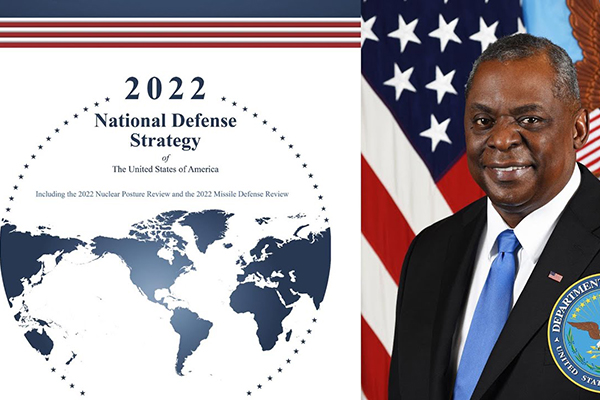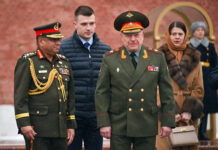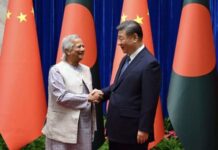
The PRC and Russia are increasingly aligned with each other but the challenges they pose are, in important ways, distinct. We will prioritize maintaining an enduring competitive edge over the PRC while constraining a still profoundly dangerous Russia.
China
“The PRC is the only competitor with both the intent to reshape the international order and, increasingly, the economic, diplomatic, military, and technological power to do it. Beijing has ambitions to create an enhanced sphere of influence in the Indo-Pacific and to become the world’s leading power. It is using its technological capacity and increasing influence over international institutions to create more permissive conditions for its own authoritarian model, and to mold global technology use and norms to privilege its interests and values. Beijing frequently uses its economic power to coerce countries. It benefits from the openness of the international economy while limiting access to its domestic market, and it seeks to make the world more dependent on the PRC while reducing its own dependence on the world. The PRC is also investing in a military that is rapidly modernizing, increasingly capable in the Indo-Pacific, and growing in strength and reach globally – all while seeking to erode U.S. alliances in the region and around the world.
“At the same time, the PRC is also central to the global economy and has a significant impact on shared challenges, particularly climate change and global public health. It is possible for the United States and the PRC to coexist peacefully, and share in and contribute to human progress together.
“Our strategy toward the PRC is threefold: 1) to invest in the foundations of our strength at home – our competitiveness, our innovation, our resilience, our democracy, 2) to align our efforts with our network of allies and partners, acting with common purpose and in common cause, and 3) compete responsibly with the PRC to defend our interests and build our vision for the future. The first two elements— invest and align— are described in the previous section and are essential to out-competing the PRC in the technological, economic, political, military, intelligence, and global governance domains.
“Competition with the PRC is most pronounced in the Indo-Pacific, but it is also increasingly global. Around the world, the contest to write the rules of the road and shape the relationships that govern global affairs is playing out in every region and across economics, technology, diplomacy, development, security, and global governance.
“In the competition with the PRC, as in other arenas, it is clear that the next ten years will be the decisive decade. We stand now at the inflection point, where the choices we make and the priorities we pursue today will set us on a course that determines our competitive position long into the future.
“Many of our allies and partners, especially in the Indo-Pacific, stand on the frontlines of the PRC’s coercion and are rightly determined to seek to ensure their own autonomy, security, and prosperity. We will support their ability to make sovereign decisions in line with their interests and values, free from external pressure, and work to provide high-standard and scaled investment, development assistance, and markets.
“Our strategy will require us to partner with, support, and meet the economic and development needs of partner countries, not for the sake of competition, but for their own sake. We will act in common purpose to address a range of issues – from untrusted digital infrastructure and forced labor in supply chains and illegal, unreported, and unregulated fishing. We will hold Beijing accountable for abuses – genocide and crimes against humanity in Xinjiang, human rights violations in Tibet, and the dismantling of Hong Kong’s autonomy and freedoms – even as it seeks to pressure countries and communities into silence. We will continue prioritizing investments in a combat credible military that deters aggression against our allies and partners in the region, and can help those allies and partners defend themselves.
“We have an abiding interest in maintaining peace and stability across the Taiwan Strait, which is critical to regional and global security and prosperity and a matter of international concern and attention. We oppose any unilateral changes to the status quo from either side, and do not support Taiwan independence. We remain committed to our one China policy, which is guided by the Taiwan Relations Act, the Three Joint Communiques, and the Six Assurances. And we will uphold our commitments under the Taiwan Relations Act to support Taiwan’s self-defense and to maintain our capacity to resist any resort to force or coercion against Taiwan.
“Though allies and partners may have distinct perspectives on the PRC, our diplomatic approach, and the PRC’s own behavior, has produced significant and growing opportunities to align approaches and deliver results. Across Europe, Asia, the Middle East, Africa, and Latin America, countries are clear-eyed about the nature of the challenges that the PRC poses. Governments want sustainable public finances. Workers want to be treated with dignity and respect. Innovators want to be rewarded for their ingenuity, risk-taking, and persistent efforts. And enterprising businesses want open and free waters through which their products can be traded.
“While we compete vigorously, we will manage the competition responsibly. We will seek greater strategic stability through measures that reduce the risk of unintended military escalation, enhance crisis communications, build mutual transparency, and ultimately engage Beijing on more formal arms control efforts. We will always be willing to work with the PRC where our interests align. We can’t let the disagreements that divide us stop us from moving forward on the priorities that demand that we work together, for the good of our people and for the good of the world. That includes on climate, pandemic threats, nonproliferation, countering illicit and illegal narcotics, the global food crisis, and macroeconomic issues. In short, we’ll engage constructively with the PRC wherever we can, not as a favor to us or anyone else, and never in exchange for walking away from our principles, but because working together to solve great challenges is what the world expects from great powers, and because it’s directly in our interest. No country should withhold progress on existential transnational issues like the climate crisis because of bilateral differences.

















